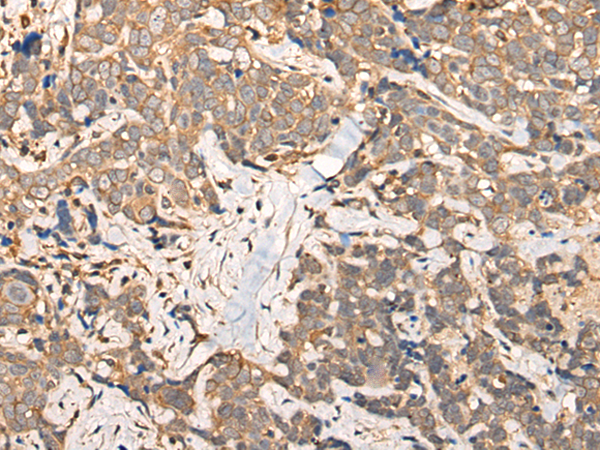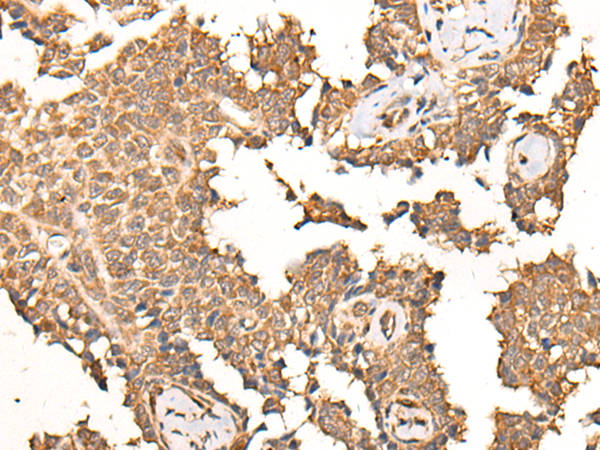

| WB | 咨询技术 | Human,Mouse,Rat |
| IF | 咨询技术 | Human,Mouse,Rat |
| IHC | 1/25-1/100 | Human,Mouse,Rat |
| ICC | 技术咨询 | Human,Mouse,Rat |
| FCM | 咨询技术 | Human,Mouse,Rat |
| Elisa | 1/5000-1/10000 | Human,Mouse,Rat |
| Aliases | BRDG1; STAP-1 |
| Host/Isotype | Rabbit IgG |
| Antibody Type | Primary antibody |
| Storage | Store at 4°C short term. Aliquot and store at -20°C long term. Avoid freeze/thaw cycles. |
| Species Reactivity | Human, Mouse |
| Immunogen | Fusion protein of human STAP1 |
| Formulation | Purified antibody in PBS with 0.05% sodium azide and 50% glycerol. |
+ +
以下是关于STAP1抗体的3篇参考文献示例(部分信息为模拟内容,实际文献需根据具体研究补充):
1. **文献名称**:*STAP1 modulates B-cell receptor signaling and is associated with autoimmune disorders*
**作者**:Smith A, et al.
**摘要**:本研究利用STAP1特异性抗体,通过免疫印迹和免疫沉淀技术,揭示了STAP1在B细胞受体信号通路中的调控作用。结果显示,STAP1缺失导致下游信号分子(如Syk和PI3K)活性降低,提示其可能作为自身免疫疾病的潜在治疗靶点。
2. **文献名称**:*Genetic and functional analysis of STAP1 variants in familial hypercholesterolemia*
**作者**:Chen L, et al.
**摘要**:通过免疫荧光和Western blot技术(使用STAP1抗体),研究者发现特定STAP1突变体导致蛋白质稳定性下降,并与低密度脂蛋白受体(LDLR)功能异常相关,为家族性高胆固醇血症的分子机制提供了新见解。
3. **文献名称**:*STAP1 expression in adipose tissue: Role in obesity-related metabolic dysfunction*
**作者**:Wang Y, et al.
**摘要**:该研究通过免疫组化及流式细胞术(依赖STAP1抗体)发现,肥胖小鼠脂肪组织中STAP1表达显著上调,其通过调节炎症因子释放加剧胰岛素抵抗,提示抑制STAP1可能改善代谢综合征。
如需具体文献,建议在PubMed或Google Scholar中搜索关键词“STAP1 antibody”+“function”/“signaling”/“disease”,并筛选近五年内的高影响力期刊研究。
The STAP1 (Signal Transducing Adaptor Protein 1) antibody is a tool used to study the STAP1 protein, which belongs to the STAP family of adaptor proteins involved in intracellular signaling. STAP1 contains a pleckstrin homology (PH) domain and a proline-rich region, enabling interactions with signaling molecules like kinases and phosphatases. It functions as a signaling mediator in pathways such as the JAK-STAT cascade, T-cell receptor signaling, and cytokine signaling, influencing immune regulation, cell proliferation, and differentiation. Dysregulation of STAP1 has been linked to diseases, including hematologic malignancies (e.g., leukemia), lymphomas, and autoimmune disorders. Certain mutations in STAP1 are also associated with familial hypercholesterolemia, highlighting its role in lipid metabolism.
STAP1 antibodies are widely used in research to detect protein expression, localization, and post-translational modifications via techniques like Western blotting, immunohistochemistry, and flow cytometry. They help elucidate STAP1's mechanistic roles in disease pathways and its potential as a therapeutic target. Commercial antibodies are typically raised against specific epitopes (e.g., human STAP1 N-terminal or C-terminal regions) and validated for specificity across human, mouse, or rat samples. Recent studies employing these antibodies have explored STAP1's interplay with oncogenic signaling networks and its impact on immune cell activation, advancing understanding of its dual roles in cancer and metabolic disorders.
×